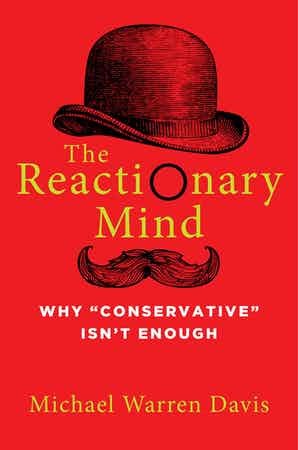Is It Reactionary to Seek the Good Life?
I first met Michael Warren Davis when, several years ago, he reached out to me, “As a man of the cloth, and one of great discernment,” to provide a contribution to the Catholic Herald for a piece on the perfect Catholic cocktail.
He recognized in me, I suppose, a fellow reactionary. And reactionaries, as he points out in his new book The Reactionary Mind, are invariably interested in the fine art of mixing and consuming drinks. Gin, along with a good pipe and a fellow tweed-clad reactionary to recite poetry with, are essential elements of the Good Life.
As a person who is fond of whimsically claiming to be a reactionary - a claim by which I mean I'm essentially medieval in outlook - the book found immediate resonance with me. When I picked it up and looked at the cover, though, I worried it was about politics. Politics are important, and I'm glad someone, somewhere engages in the public square, but I'm not personally interested. I'd be maximally happy if we were ruled by St. Louis IX and never gave politics another thought.
When I use the phrase “reactionary” applied to myself, I have in mind a rejection of modernity with all its objectifying, materialistic, functionalistic habits. When it comes to politics, I basically want to practice local, relationship-based politics that are based on the Common Good. I have no interest in joining a broader movement of the “left” or “right.” Davis is probably considered a man of the “right.” I would tend to describe myself, if forced to, as more of a Wendell-Berry-style anarchist. And yet, we essentially seek the same things. We want to be surrounded by beauty, family, nature, happiness, and, eventually, hopefully, sainthood. The label doesn't matter.
Davis, in fact, goes to great pains to move beyond politics. Many of his reactionary impulses, such as the desire to practice distributism, a social movement which, in spite of being linked to men like Chesterton, is perhaps more closely identified with the “left.” Davis doesn't seem to care much how you label it, though, because this is not a political book. It's a book about how to live the Good Life. As he concludes, “If the world has a future...It won't be the politicians...This isn't a manifesto. It's an invitation to imagine a better future, which begins by imagining a better past.” The labels of politics constrain the search
My guess would be that most readers of Dappled Things would fundamentally agree on this point – The essence of the Good Life isn't located in politics or ideology, which tend to have the opposite effect intended, crowding out basic, normal, human life. Essentially, Davis is writing about the freedom to build a culture, which is authentically located in the local, in human beings. It's a matter of interior virtue manifesting as goodness and beauty.
Here is his definition of a reactionary - “A reactionary is one who rejects the cheapness, the artificiality, of modern life. He demands the right to pursue his own happiness, and he refuses to accept mere comfort instead. He doesn't want to survive; he wants to live. And he wants to go to Heaven.” Provocative, yes (I suspect that many elements of the book are intentionally provocative, the ghosts of Chesterton and Belloc are positively drifting off the manuscript). Definitely worth thinking about.
Perhaps I should point out that I don't agree with everything in the book. Davis takes shots at Jane Austen (which horrified me), Caravaggio (my favorite artist), and Zadie Smith (who I quite enjoy reading). I don't have to agree with everything, though, in order to affirm that the book is worth reading. That's kind of the whole point. We're all free to seek the Good Life. We're all free to pray that a friend will rethink his hasty dismissal of Jane Austen. We're all free. That bond of freedom is made at a far deeper level than ideology, because it's essentially created by the virtue of charity. We're fellow human beings on the same journey, all seeking happiness, all seeking an inner transformation that brings about human flourishing. For those of us who also happen to be Catholics, we're literally a family, sacramentally strengthened in that bond of charity to form a mystical body.
The Reactionary Mind is a provocative read. Well worth checking out, particularly for the recipe in an appendix about how to mix a Pink Gin, which I totally told him about and for which he owes me big-time.

